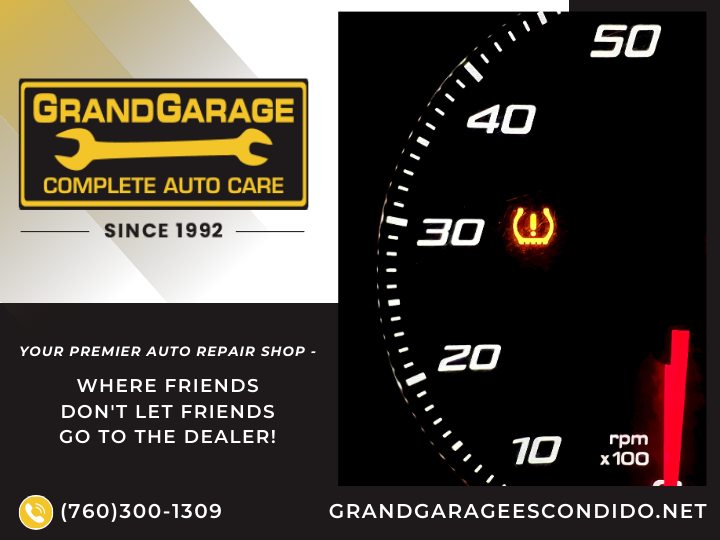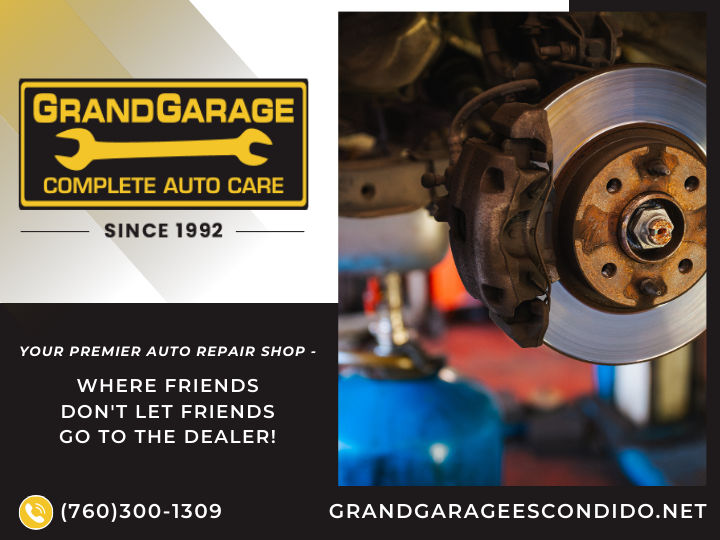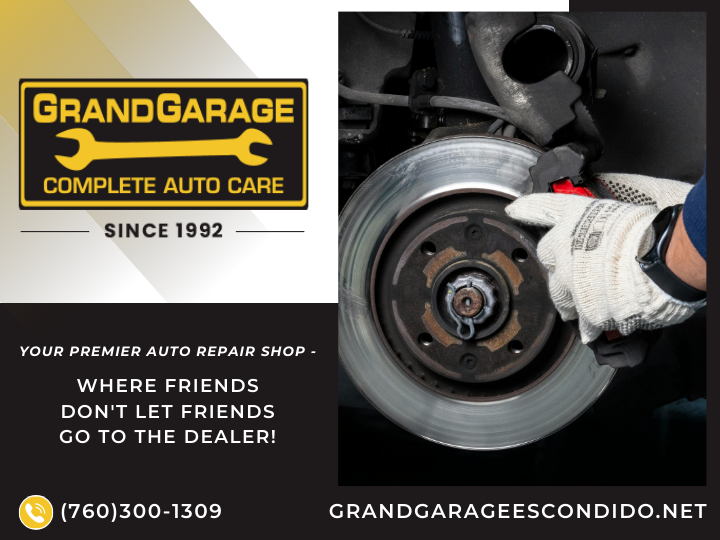Posted on 1/12/2026

Why Is My TPMS Light On? The Real Reasons Your Tire Pressure Monitoring System Activates Modern vehicles rely on complex safety systems designed to protect you long before you sense a problem. One of the most misunderstood of these systems is the TPMS light—the Tire Pressure Monitoring System warning that flashes or illuminates on your dashboard when something is off inside one or more tires. Most drivers see the light come on and assume they’re simply “a little low on air.” But the TPMS system is more than a convenience feature. It is a real-time safety alert designed to prevent tire failure, steering instability, braking issues, and unpredictable handling. In Southern California—especially in Escondido, San Marcos, Vista, Rancho Bernardo, Poway, and the greater North County area—large temperature swings, hot summer pavement, long highway drives, and varying road conditions all influence tire pressure far more than most realize. These environment ... read more
Posted on 1/9/2026

Car Mechanic vs Automotive Technician: What’s the Difference and Why It Matters for Modern Vehicles Most drivers still say they need a “car mechanic” when something feels wrong with their vehicle. The phrase is familiar, widely understood, and deeply rooted in automotive history. But vehicles today are no longer simple mechanical machines—and the professionals who service them have had to evolve just as much as the technology itself. Modern cars and trucks are highly integrated systems that combine mechanical components, electronic controls, software logic, and advanced safety technology. Because of this evolution, the difference between a traditional car mechanic and a modern automotive technician is more than semantics. It directly affects how accurately your vehicle is diagnosed, how reliably it’s repaired, and how well it performs over time. For drivers in Escondido and across North County San Diego—where commuting, heat, elevation changes, an ... read more
Posted on 1/5/2026

Why Is My ABS Light On? A Complete Guide for Escondido Drivers Your vehicle is built to communicate with you long before a small issue becomes a major breakdown or safety concern. The ABS warning light—the dashboard indicator for your Anti-Lock Braking System—is one of the most important messages your car or truck can send. Even if your brakes still feel normal, the ABS light is telling you a critical safety system is no longer functioning the way it should. This matters for every driver, but especially for those in Escondido and the surrounding North County communities, where daily driving involves sudden stops, winding roads, and traffic transitions across areas like San Marcos, Vista, Valley Center, and Poway. This detailed guide explains: • What the ABS light actually means • How the Anti-Lock Braking System works • The most common causes behind the warning • What happens when you ignore the light • Why Escondido and North County driving ... read more
Posted on 1/1/2026

Why Is My Oil Light On? A Complete 3,000-Word Guide for Drivers in Escondido, Valley Center, San Marcos, and North County San Diego You’re driving down East Grand Avenue, heading toward Bear Valley Parkway, or merging onto Highway 78 when suddenly your oil light comes on. That red oil can symbol isn’t there to startle you—it’s there to protect your engine. And unlike many dashboard reminders, the oil light is one you do not ignore. Whether you commute between Escondido and San Marcos, drive regularly through Vista or Rancho Bernardo, or live in Valley Center, Hidden Meadows, or Bonsall, the oil light is an urgent signal that something is wrong with your vehicle’s lubrication system. Understanding what this light means—and what to do next—can make the difference between a simple repair and severe engine damage. This long-form guide explains the real reasons the oil light turns on, what it means for your engine, how to respond, and how to prev ... read more
Posted on 12/29/2025

Why Is My Engine Overheating? A Complete Guide for Drivers in Escondido, CA Few dashboard warnings are more alarming than a rising temperature gauge, steam from the hood, or an engine temperature light suddenly illuminating. Whether you’re cruising along East Grand Avenue, merging onto I-15, or creeping through traffic near San Diego Safari Park, an overheating engine demands immediate attention. But here’s the deeper truth: Engines do not overheat without a reason. Overheating is always the result of a failure—large or small—within your cooling or lubrication system. In Escondido, San Marcos, Vista, Valley Center, Rancho Bernardo, Poway, and North County, vehicles experience heavy heat exposure, steep grades, traffic congestion, and fast temperature swings. Local conditions accelerate wear on the components meant to keep your engine at a stable operating temperature. This long-form guide gives you: The real meaning of overheating Every major caus ... read more
Posted on 12/26/2025

Towing Company Near Me: What to Do When Your Vehicle Can’t Safely Move Vehicle breakdowns rarely come with warning—and they never happen at a convenient time. One moment everything feels normal, and the next your dashboard lights up, the engine loses power, or the vehicle simply will not move. In those moments, stress rises quickly and one thought dominates: “Where can I find a reliable towing company near me?” That question is not just about getting help quickly. It is about making the right decision under pressure, protecting your vehicle from further damage, and ensuring your safety in the process. Towing is often misunderstood as a simple service, but in reality it plays a critical role in preserving modern vehicles. The wrong towing decision can create additional mechanical problems, compromise safety systems, or delay proper diagnosis. The right decision moves the situation toward clarity and resolution. For drivers in and around Escondido, San Marcos ... read more
Posted on 12/22/2025

Timing Belt Replacement: Protecting Your Engine and Extending Vehicle Life Introduction: Why Timing Belts Are Critical When most drivers think about vehicle maintenance, they picture oil changes, brakes, or tire rotations. But one of the most vital components in your engine is one you rarely see: the timing belt. The timing belt keeps your engine’s most important parts synchronized. If it fails, the damage can be immediate and devastating—bent valves, damaged pistons, and in many cases, complete engine failure. For drivers in Escondido, CA, and nearby areas like San Marcos, Vista, Poway, and North County San Diego, timing belt replacement is one of the smartest maintenance choices you can make. At Grand Garage, we help local drivers avoid catastrophic breakdowns with professional timing belt inspection and replacement. This guide will walk you through everything you need to know to protect your vehicle’s reliability. What Is a Timing Belt? A timin ... read more
Posted on 12/19/2025

A Smoother Ride Awaits: Grand Garage is Your Expert Suspension Shop in Escondido, CA Your car is a marvel of modern engineering, a complex system designed to transport you safely and comfortably. But when you hit a pothole, and the car bounces more than it should, or a new, unsettling clunking noise emerges from under the chassis, the feeling of control and comfort can quickly disappear. These are not just minor annoyances; they are your vehicle’s way of signaling that its suspension system is in distress. A failing suspension compromises your car’s safety, affects its handling, and can lead to a cascade of more expensive repairs down the line. When you find yourself searching for a “suspension shop near me” in Escondido, California, you need a partner you can trust—a team that provides honest diagnostics, expert service, and a complete solution. For over three decades, Grand Garage has been that trusted partner for drivers in Escondido and throughout No ... read more
Posted on 12/14/2025

Top 5 Reasons Your Car Needs Brake Service – Protecting Your Safety on Every Drive Your brakes are your car’s most essential safety system. Every time you stop at a red light in Escondido, navigate the hills of North County, or drive along East Valley Parkway, you rely on your braking system to respond instantly and keep you in control. But over time, heat, friction, and wear can reduce braking performance — often without you realizing it. In this in-depth guide, we’ll cover the top five reasons your car needs brake service, how to recognize the warning signs, and why preventive maintenance is critical for your safety and your vehicle’s long-term health. 1. Worn Brake Pads Are Reducing Your Stopping Power Brake pads wear down gradually every time you apply pressure to the pedal. They’re built to handle friction — but once that friction material becomes too thin, performance drops sharply. You may notice: Squealing or chirpi ... read more
Posted on 12/12/2025

What Is the Cause of That Clunking Sound in My Truck? (An Expert Diagnostic and Maintenance Guide for Truck Owners in Escondido, CA and Surrounding Areas) Introduction: When Your Truck Starts to Clunk, Don’t Ignore It Few things grab a driver’s attention faster than a clunking sound from underneath their truck. It might happen when you accelerate up Grand Avenue, turn through an intersection, or hit a bump along Bear Valley Parkway. That deep, metallic knock is your truck’s way of telling you something isn’t right. Clunking noises rarely come from harmless causes. They typically mean that something in your suspension, drivetrain, or steering system has loosened, worn, or shifted out of place. While the sound might start small, the underlying problem can escalate quickly—impacting performance, comfort, and safety. This in-depth guide explains what causes clunking sounds in trucks, how to identify the source, and how proactive maintenance ... read more